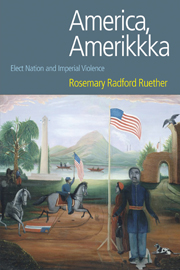Book contents
- Frontmatter
- Dedication
- Contents
- Introduction: THE TWO FACES OF AMERICA: THE IDEAL AMERICA AS DECEPTION AND AS PROTEST
- Chapter One ELECT NATIONS OF EUROPE AND THE MAKING OF THE AMERICAN MYTH OF CHOSENNESS
- Chapter Two THE RIGHTS OF MAN AND THE EXCLUDED OTHERS — THE REVOLUTIONARY ERA AND BEYOND
- Chapter Three MANIFEST DESTINY AND ANGLO-SAXON RACISM — 1815-1875
- Chapter Four MANIFEST DESTINY AND AMERICAN EMPIRE: 1890-1934
- Chapter Five AMERICA'S GLOBAL MISSION: THE COLD WAR ERA, 1945-89
- Chapter Six AMERICAN EMPIRE AND ITS DENOUEMENT: 1990-2007
- Chapter Seven ALTERNATIVE VISIONS OF AMERICA: THE PROTEST TRADITION
- Chapter Eight TOWARD A U.S. THEOLOGY OF LIBERATION AND LETTING GO
- BIBLIOGRAPHY
- INDEX OF BIBLICAL REFERENCES
- GENERAL INDEX
Chapter Two - THE RIGHTS OF MAN AND THE EXCLUDED OTHERS — THE REVOLUTIONARY ERA AND BEYOND
- Frontmatter
- Dedication
- Contents
- Introduction: THE TWO FACES OF AMERICA: THE IDEAL AMERICA AS DECEPTION AND AS PROTEST
- Chapter One ELECT NATIONS OF EUROPE AND THE MAKING OF THE AMERICAN MYTH OF CHOSENNESS
- Chapter Two THE RIGHTS OF MAN AND THE EXCLUDED OTHERS — THE REVOLUTIONARY ERA AND BEYOND
- Chapter Three MANIFEST DESTINY AND ANGLO-SAXON RACISM — 1815-1875
- Chapter Four MANIFEST DESTINY AND AMERICAN EMPIRE: 1890-1934
- Chapter Five AMERICA'S GLOBAL MISSION: THE COLD WAR ERA, 1945-89
- Chapter Six AMERICAN EMPIRE AND ITS DENOUEMENT: 1990-2007
- Chapter Seven ALTERNATIVE VISIONS OF AMERICA: THE PROTEST TRADITION
- Chapter Eight TOWARD A U.S. THEOLOGY OF LIBERATION AND LETTING GO
- BIBLIOGRAPHY
- INDEX OF BIBLICAL REFERENCES
- GENERAL INDEX
Summary
The founders of the godly commonwealths came to North America to pursue their vision of the true church and society, but they had no more intention of including Christians of other views in their communities than the English establishment was willing to include them. Both shared an exclusive view of the true church coterminous with the nation, or, in the case of the Puritan settlers, coterminous with their own covenanted community. From the beginning of the foundation of the Massachusetts Bay colony, there were clashes with Christians of other persuasions.
Catholics were, of course, totally excluded as the demonic alien of the Puritan worldview, and the French Catholic settlement to the North was regarded as its sworn enemy. Anglicans were looked on with suspicion and classified as dissenters in New England. When the Church of England developed the Society for the Propagation of the Gospel in Foreign Parts in 1701 to evangelize the colonies, and especially when there was talk of founding an American episcopacy, this was seen as part of an English conspiracy to subject the Puritans of Massachusetts to the joint power of bishops and crown. There were also constant efforts by the Puritan divines to exclude any tendency toward Presbyterianism in their midst.
Separatists and more radical dissenters were rigorously excluded. The Separatists of Plymouth colony were regarded with suspicion, but since they were a self-governing colony, the Massachusetts ministry and magistracy had no direct jurisdiction over them.
- Type
- Chapter
- Information
- America AmerikkkaElect Nation and Imperial Violence, pp. 33 - 69Publisher: Acumen PublishingPrint publication year: 2007



